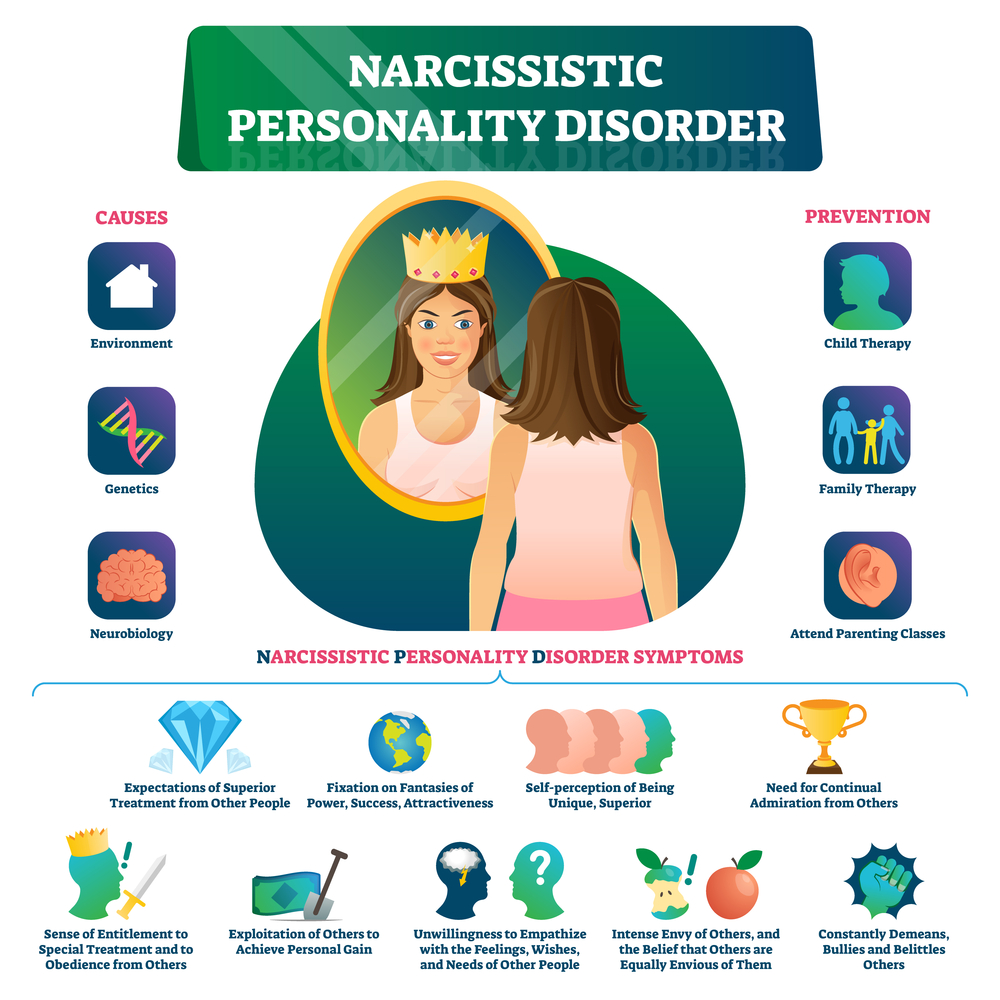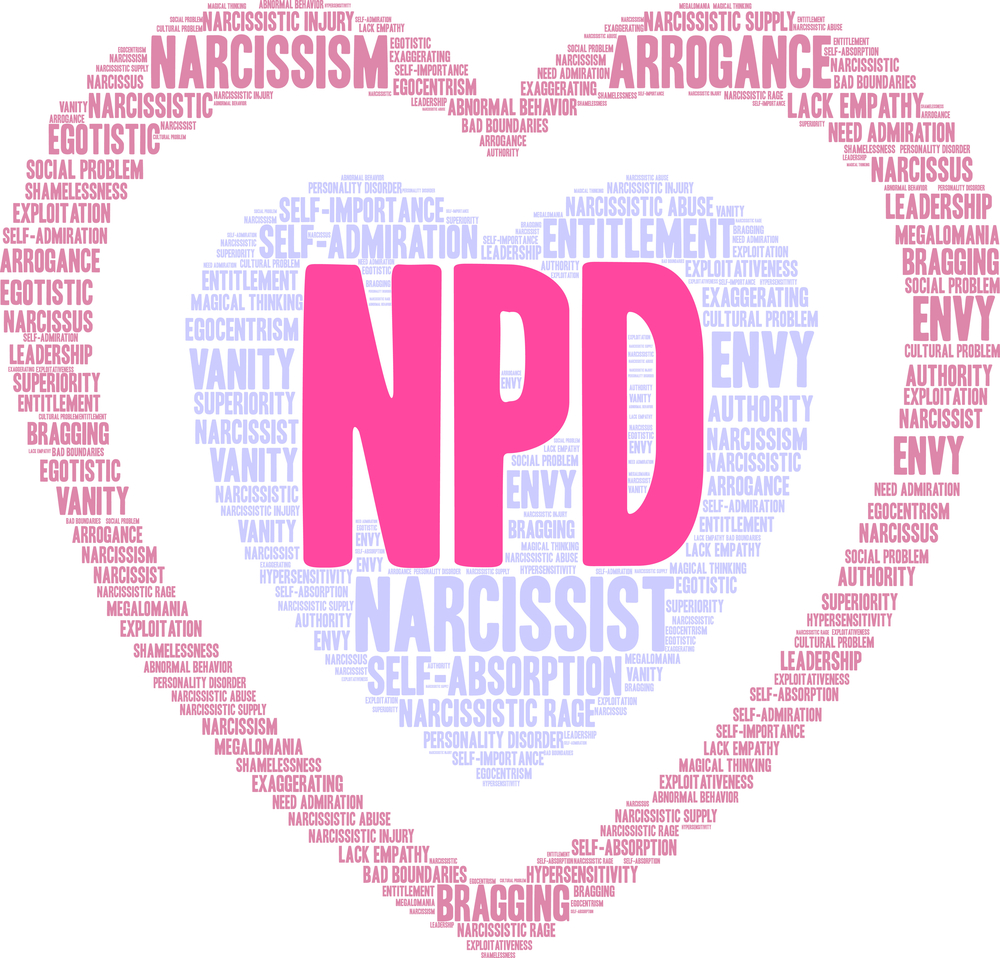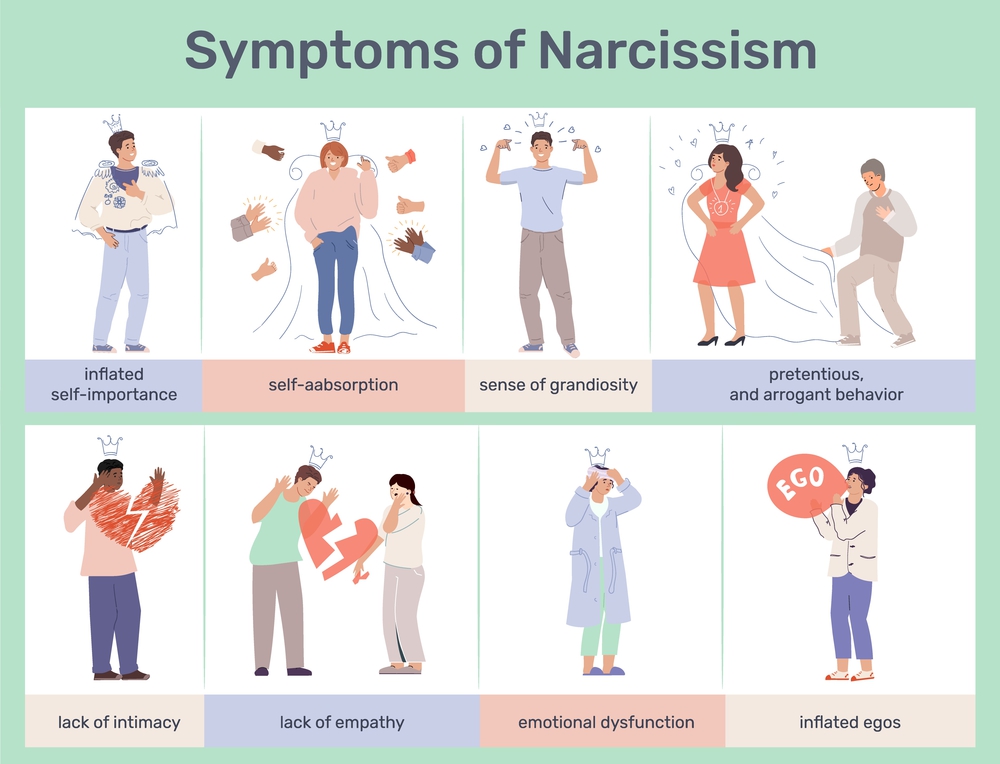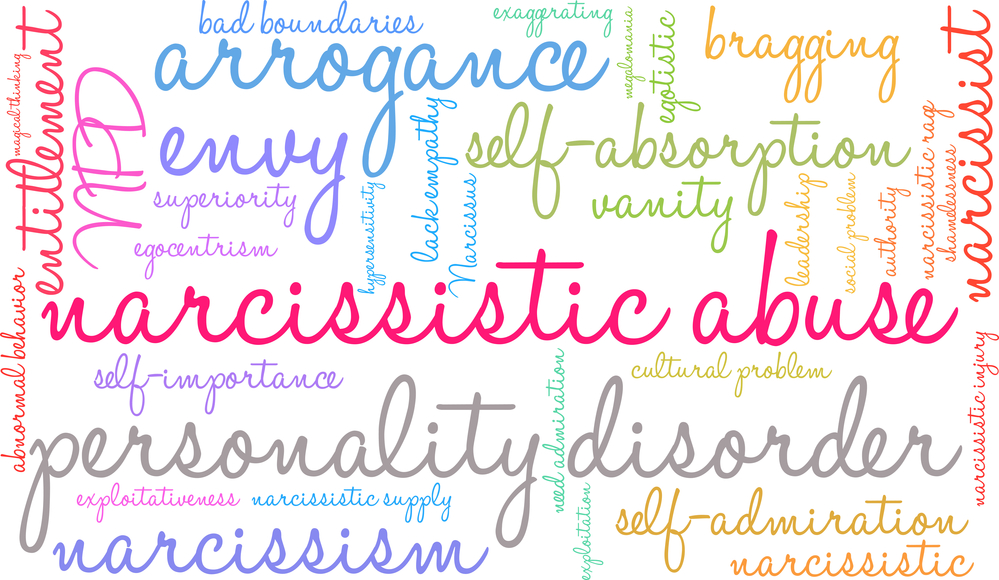When a Narcissist Sees You Looking Good: The Unsettling Reaction
 Your demeanor and confidence change are often visible when you progress in your personal development and feel good about your appearance. This transformation can be empowering for you, but if a narcissist is in your social sphere, their reaction to your improvement can be incredibly revealing. Part of understanding narcissism involves recognizing how narcissists often […]
Your demeanor and confidence change are often visible when you progress in your personal development and feel good about your appearance. This transformation can be empowering for you, but if a narcissist is in your social sphere, their reaction to your improvement can be incredibly revealing. Part of understanding narcissism involves recognizing how narcissists often […]Your demeanor and confidence change are often visible when you progress in your personal development and feel good about your appearance. This transformation can be empowering for you, but if a narcissist is in your social sphere, their reaction to your improvement can be incredibly revealing. Part of understanding narcissism involves recognizing how narcissists often view success and confidence in others as a reflection of themselves.
The way a narcissist reacts when they see you looking good can manifest in various behaviors. They may respond with compliments that feel insincere or backhanded or exhibit competitiveness, trying to outshine you or downplay your achievements. Your confidence may threaten their self-esteem, or they may attempt to take credit for your efforts. It’s important to recognize these patterns to navigate the complex social dynamics.
Maintaining a sense of self-empowerment is vital in these interactions. You can easily manage these encounters when you understand that their responses are more about their insecurities than your success. Recognize that you cannot control how you perceive and respond to their reaction. Remember that seeking professional help if you're in a close relationship with a narcissist can provide strategies for dealing with their behavior while preserving your well-being.
Key Takeaways
- Recognizing a narcissist's reaction to your success can inform your understanding of their behavior.
- Maintaining confidence is key when dealing with a narcissist's response to your improved appearance.
- Professional guidance may be beneficial in managing interactions with a narcissist.

Understanding Narcissism
When you try to understand narcissism, it’s crucial to know that it's more than just an obsession with one's appearance or accomplishments. It's a complex condition characterized by deep-seated issues of self-esteem tangled with lofty perceptions of oneself.
Defining Narcissistic Personality Disorder
Narcissistic Personality Disorder (NPD) is a mental health condition that's part of a larger group known as personality disorders. At its core, it's a long-term pattern of abnormal behavior characterized by the following:
- Exaggerated feelings of self-importance: Individuals believe they are superior and expect to be recognized as such.
- Need for excessive attention and admiration: Constant need for compliments and recognition.
- Lack of empathy: Difficulty in recognizing and considering other people's feelings.
Key Takeaway: Narcissism is not just about confidence; it's recognized as a diagnosable disorder that significantly affects social interactions.
Traits of Narcissism in Individuals
The traits of narcissism can manifest in behavior that drives the way individuals interact with the world and perceive themselves:
- A sense of entitlement: Expecting special treatment and unquestioning compliance with their expectations.
- Interpersonal exploitation: Taking advantage of others to achieve personal ends.
- Envious of others: Often believe others are envious of them as a reflection of their perceived superiority.
- Increased or decreased self-esteem, which may seem contradictory. Narcissists may appear to have high self-confidence, but this may mask very fragile self-esteem.
Key Takeaway: Recognizing these traits can help you understand interactions with individuals who exhibit narcissistic characteristics and may aid in managing expectations when dealing with them.

The Narcissist's Reaction to Your Success
When you succeed, a narcissist may have a complex array of reactions, often stemming from their insecurities.
Jealousy and Envy
- Feeling threatened: When you shine, the narcissist perceives this as a threat to their status.
- Jealous behaviors: They might minimize your accomplishments or spread gossip to tarnish your success.
Key takeaway: Stay aware of the narcissist's tendency to see your achievements as diminishing theirs.
The Push for Superiority
- Asserting dominance: The narcissist might share their achievements to reestablish their superiority.
- Competitive actions: Expect to be challenged as they strive to prove they're still on top.
Key takeaway: Your success may become a catalyst for heightened competition from the narcissist.
 Social Dynamics
Social Dynamics
When you're looking good, it can shift the social dynamics around you, particularly with a narcissist present. Their response could be shaped by their hunger for attention and how they engage with social media.
Attention Seeking Behaviors
Narcissists often gravitate towards the limelight, seeking validation and popularity. When you catch their eye, here's what you might observe:
- Increased self-promotion: They may share stories highlighting their achievements to steer the conversation back to themselves.
- Competition: They could turn the situation into a contest, subtly or overtly comparing themselves to you to regain attention.
These behaviors surface because your newfound glow can be seen as a challenge to a narcissist—a test to their perceived dominance in social settings.
Key takeaway: Keep an eye out for subtle shifts in conversation or overt displays that signal a narcissist's need to regain the spotlight.
Narcissists in Social Media
Social media fuels narcissistic tendencies by offering a platform for constant self-affirmation. Here's how a narcissist’s behavior can manifest online:
- Curated appearance: They spend considerable time managing their online image, posting content that garners likes and comments, reinforcing their sense of superiority.
- Reaction to others: If you're looking good and sharing it online, a narcissist may react by either copying your style or attempting to one-up you with their posts.
Through likes and comments, social media can become an arena where narcissists vie for public attention and validation.
Key takeaway: Stay true to yourself on social platforms; a narcissist's response to your shine isn't a reflection of your worth but a showcase of your insecurities.
 Relationships and Dating
Relationships and Dating
When you look good, it can have distinct effects on relationships, mainly when dating someone with narcissistic tendencies.
The Cycle of Dating a Narcissist
In the first flushes of romance, your narcissist partner may lavish you with attention and compliments. Your appearance and the way you carry yourself can be a source of validation for them, especially in how it reflects on their image.
- Idealization Stage: You might be overwhelmed by their charm and seemingly undivided attention.
However, this stage can be fleeting. Once the initial excitement wears off and you continue to shine and perhaps attract attention, the narcissistic partner's demeanor can change.
- Devaluation Stage: The initial admiration can turn into envy or competitive behavior. It's not uncommon for a narcissist to feel threatened when you look good, resulting in a need to bring you down to boost their ego.
This cycle can affect the connection you thought was genuine at the start of dating.
- Strategy for Handling: Maintain a strong sense of self-worth and boundaries. Recognizing this pattern can help you make informed decisions about managing the relationship.
It's essential to remember that while compliments from your partner can feel good, your self-esteem should not be solely dependent on their, or anyone else's, validation.
- Key Takeaway: Be alert to the patterns of idealization and devaluation, and protect your self-esteem from being tied to your partner's perception.

The Role of Appearance
When you take the time to polish your appearance, it says a lot without speaking a word. How you look can profoundly impact perceptions and interactions, especially with someone who places high value on physical appearance.
Perceptions of Attractiveness
Attractiveness is not just about beauty; it's a blend of qualities that can catch the eye and stir interest. Your confidence is magnetic; when you look good, you feel good, and that inner assurance often shines brighter than your outward appearance.
- Appearance:
- Serves as a non-verbal cue about your style and personality.
- Influences first impressions and can set the tone for future interactions.
- Confidence:
- Bolstered by looking your best, it’s an invisible cloak that heightens your presence.
- Translates to positive body language, sending strong, self-assured signals.
- Beauty:
- Perceived in various forms, what's attractive to one may differ from another.
- Often integrates with a sense of self-care and well-being.
Attractive isn't just skin-deep. It's how you carry yourself, the poise you exude, and the aura you radiate when you're at your best.
- Key Takeaway: Enhancing your appearance can boost your confidence and affect how others, including narcissists, perceive and react to you. It's a powerful element in your social toolkit.
 Emotional Responses
Emotional Responses
When you're looking good and confident, a narcissist might grapple with a whirlwind of internal emotions ranging from jealousy to insecurity. Their need for admiration and the pain of seeing you thrive can trigger complex feelings.
Handling Negative Emotions
- Jealousy: The sight of you, well-put-together, can spark envy in a narcissist. They may resent the attention you receive, feeling sidelined.Strategy: Keep your poise. Acknowledge their feelings without feeding the jealousy. You might say, "I notice you seem uncomfortable. Is everything okay on your end?"
- Fear and Rejection: Your radiant appearance can be intimidating, igniting a narcissist's fear of rejection. They worry about not being the center of attention.Tip: Affirm your boundaries. It's okay to reassure them of their worth, but maintain your distance to protect your well-being.
- Insecurity: Your confidence can mirror their lack, leading to heightened insecurity.Takeaway: Focus on your inner peace. If they attempt to undermine you, remember it reflects their insecurities, not your value.
- Shame: When a narcissist's ex-partner looks good, it can elicit shame over losing you.Advice: Stay true to yourself. Their shame is not yours to manage. Continue to build your life with positivity.
Handling these negative emotions with grace will keep you strong and unshaken. Remember, you are in control of your happiness.
 Managing Interactions
Managing Interactions
When you're looking good and feeling confident, it's essential to navigate interactions with grace, especially if you encounter a narcissist who may react in unpredictable ways.
Dealing with Criticism and Rumors
Criticism: It’s like an unexpected gust of wind; it can catch you off guard. A narcissist might throw a sharp word your way, often covertly wrapped in a backhanded compliment. Here's what you can do:
- Pause before you respond. This gives you time to collect your thoughts.
- Acknowledge the comment with a simple "Thank you" or "I'll consider that" to keep the interaction short and dignified.
- Don't take the bait. It can be challenging to stay calm, but remember that your reaction is what the critic is hoping to disturb.
Key Takeaway: Always respond to criticism calmly and confidently without letting it rattle your self-esteem.
Rumors: Much like wildfire, rumors sparked by a narcissist can spread quickly and cause damage. Defense is your ally here:
- Stay informed. You can better prepare your response when you know what's being said.
- Correct misinformation by providing facts but avoid getting into heated debates.
- Lean on your support system. Friends who know your true character will be invaluable.
Key Takeaway: Rumors can be hurtful, but maintaining your integrity and addressing falsehoods with facts can mitigate their impact.
All the while, it's important to remember that any admiration from a narcissist might come with strings attached. It's wise to appreciate positive attention and recognize when it's genuine or a setup for more manipulation. Stay vigilant, trust your intuition, and keep interactions straightforward and sincere.
Self-Empowerment
When you try to look your best, it often reflects a deeper journey of self-empowerment. It's not just about appearances but the internal transformation that boosts your self-esteem and confidence.
Cultivating Self-Esteem and Happiness
Building self-esteem is like tending a garden. It needs regular care and the proper nourishment to flourish. Here's how you can nurture your inner garden:
- Daily Affirmations: Start your day with positive statements about yourself. Say, "I am capable and strong," and believe it.
- Set Achievable Goals: Outline steps to reach goals that reflect your values. Celebrating small wins can lead to a great sense of achievement.
- Surround Yourself with Positivity: Spend time with people who uplift you and avoid those who drain your energy.
- Embrace Your Uniqueness: Your individuality is your superpower. Acknowledge it.
- Practice Self-Care: Prioritize your well-being through exercise, reading, or a relaxing bath.
- Learn New Skills: This enhances your competence and adds to your life's joy.
The journey to high self-esteem and happiness is ongoing. Remember, you're not just dressing up for a moment; you're dressing up your soul for a lifetime of success.
When encountering a narcissist after you've made visible improvements in your life, it's crucial to be equipped to handle their reactions effectively.
Overcoming the Narcissist's Control
Communication Boundaries:
Establish clear boundaries for how and when you'll engage with the narcissist. It might look something like this:
- Email and Text: Limiting contact to written forms can provide time to think before you respond.
- Public Spaces: Choose neutral, public meeting locations to discourage scenes or confrontations.
Self-affirmation Techniques:
- Repeat positive affirmations to yourself. For example, "I am in control of my life" or "I am worthy of respect."
- Maintain a journal documenting your successes and feelings.
Support System:
- Keep close friends and family in the loop about your progress and the challenges you face.
- Consider a therapist or support group that can offer professional guidance.
Avoid the Competition Trap:
Understand that the narcissist may view your success as a challenge to their status. Remember:
- Your achievements are your own and not a scoreboard.
- Engage with them from a place of security in your self-worth, not as a competitor.
Key Takeaway: By setting firm boundaries and reinforcing your self-esteem, you can maintain your composure in the face of a narcissist's efforts to regain control.

Seeking Professional Help
Understanding when to approach a therapist is crucial if you're dealing with a narcissist who reacts negatively to you looking good. A therapist can guide you through complex emotions and help bolster your relationship resilience.
When to Consult a Therapist
- Jealousy from a Narcissist: If a narcissist's jealousy begins to affect your mental well-being or escalates into harmful behavior, it's time to consult a therapist. Their expertise can help you navigate the intricacies of your emotions and relationship dynamics.
- Handling Your Emotions: Feeling a whirlwind of emotions in such a situation is normal. A therapist can offer strategies to cope with feelings of discomfort or guilt that may arise when you receive negative attention for looking good.
- Improving Relationship Health: Whether it's romantic or platonic if your relationship with a narcissist is essential to you, a therapist can provide tips on setting boundaries and communicating effectively.
By working with a therapist, you equip yourself with the tools necessary to address the unique challenges presented by a narcissist's reaction. Your journey to emotional resilience and healthier relationships is paramount, and professional help can be your ally.
Moving Forward
When you encounter a narcissist noticing your progress or achievements, stay focused on your path. Here's how you can continue to thrive.
Building Healthy Relationships
You deserve to be surrounded by people who celebrate your success, not those who see it as a competition.
- Choose empathy: Look for friends who show understanding and empathy.
- Set boundaries: It's essential to establish limits on what's acceptable.
Remember, by nurturing relationships built on mutual respect and kindness, you reach a state of shared happiness and support.
Fostering Your Own Success
Your achievements are yours to celebrate, and maintaining your progress is key to long-term happiness.
- Set personal goals: Identify what success looks like for you and set targets to aim for.
- Celebrate milestones: Acknowledging every step forward reinforces your motivation.
Key Takeaway: Success is sweeter when it aligns with your values and when shared with the right people. Keep setting goals, and take joy in every achievement, big or small.
Frequently Asked Questions
Navigating the complex behaviors of a narcissist when they see you thriving can be tricky. These FAQs will help you understand the tell-tale signs and how to interpret their actions.
How can you tell if a narcissist is jealous of your new relationship?
A narcissist might display jealousy over your new relationship with subtle or overt behaviors. They could make snide remarks about your partner or try to undermine your relationship by bringing up your past together. Remember, their ego may be bruised, and their reactions are a reflection of that discomfort.
What are the indicators that a narcissist ex is attempting to garner your attention post-breakup?
If your narcissistic ex wants your attention, they might suddenly become more present on your social media, often reacting or commenting on your updates. They could also reach out under the pretense of needing closure or pretending to be concerned for your well-being. Their goal is to stay relevant in your life.
How do narcissistic individuals typically react to their ex-partner's success?
Narcissists may react to an ex's success with a mix of admiration and envy. You might receive backhanded compliments or attempts to belittle your achievements. It's their way of simultaneously grappling with the feeling that your success reflects on them positively and negatively.
Are there specific behaviors that suggest a narcissist wants to rekindle a past relationship?
If a narcissist wishes to reconnect, they might start by reminiscing about the 'good old days' with you, showcasing their change for the better, or indulging in grand gestures. These actions often attempt to reignite a spark, aiming to remind you of what you once shared.
In what ways might a narcissist respond to your happiness without them?
A narcissist might respond to your happiness without them in unpredictable ways. They could act indifferently or play the 'I'm happier without you' card. On the other hand, they may try to sabotage your happiness by causing drama. It's their way of coping with not being the center of your joy.
What traits are narcissists commonly attracted to in their partners?
Narcissists often gravitate towards partners who exhibit empathy, patience, and a desire to please. These qualities allow the narcissist to feel admired and maintain control. If you possess these traits, you must be mindful of your boundaries to avoid being manipulated.

